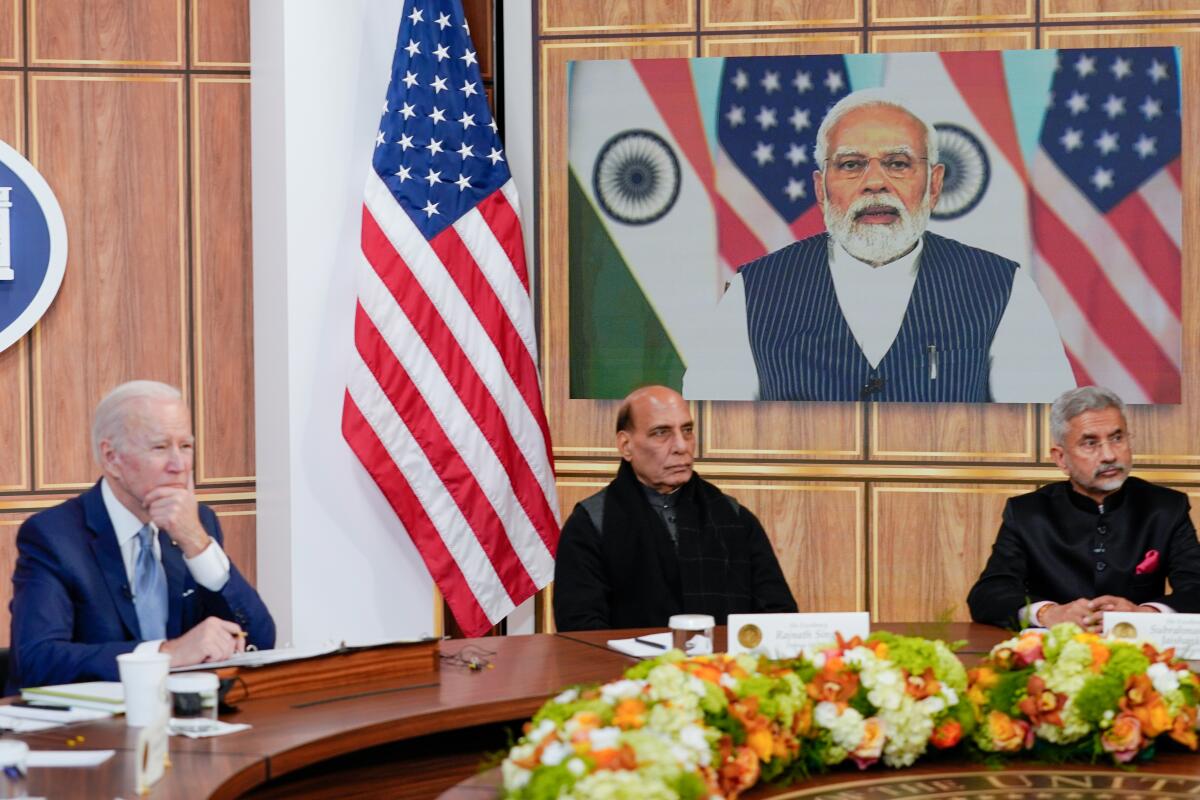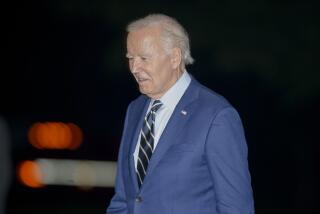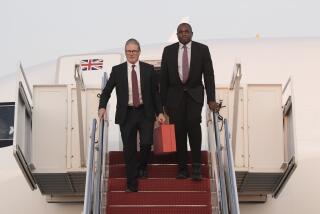U.S. lobbies India to join support for Ukraine, opposition to Russia

WASHINGTON — President Biden and his top Cabinet members spent much of Monday lobbying their Indian counterparts in a so-far-unsuccessful bid to persuade the world’s largest democracy to join the U.S.-led movement to support Ukraine against Russia’s military onslaught.
In a virtual meeting with Indian Prime Minister Narendra Modi, Biden praised relations between Washington and New Delhi that have improved significantly in recent years. Modi responded that the two countries are “natural allies.”
But they are not allied in the current crisis consuming the energies of much of the Western world.
India has abstained on several votes in the United Nations to condemn Russia for its brutal invasion of Ukraine, where thousands of civilians may have been killed and some 4.5 million have been forced to flee the country. The Biden administration says it believes Russian President Vladimir Putin’s forces are committing war crimes.
“It’s a tough spot for the Indians ... between a rock and a hard place,” said Vikram Singh, an Asia expert at the U.S. Institute for Peace, a Washington think tank.
India is wholly reliant on Russia for its weapons, a decades-long relationship that dates to a 1971 war in which India was backed by Russia, while Pakistan, India’s bitter enemy, was backed by the U.S.
India also depends on Russia for fertilizer and other agricultural products to feed its 1.4 billion people.
For Indians, Singh said, higher energy prices don’t just mean more at the gas pump — they mean food insecurity and hunger.
“Indians are just as horrified as anyone, but India is a poor country,” Singh said. “Taking the risk of burning relations with Russia has no real upside.”
A senior Biden administration official who briefed reporters after the talks with Modi said the two leaders had a “candid exchange of views” on the war in Ukraine, but there was “no concrete ask, no concrete response.”
The official — speaking without attribution, in keeping with White House protocol — said Biden and Modi also discussed ways to mitigate the effect that sanctions against Russia might have on food security in India and ways to diversify India’s economy to make it less dependent on trade with Russia. Biden urged Modi not to increase imports of Russian gas and oil, the official said.
India imports less than 2% of its energy supplies from Russia and around 10% from the United States, according to U.S. officials.
Weaning India off Russian weaponry would take years and be very costly, experts say. One alternative might be for India to ramp up domestic production of armaments and critical parts for fighter jets and helicopters.
More than 10,000 civilians have been killed in Mariupol, as Russians use mobile cremation equipment to conceal war crimes, a city official says.
Despite its long-standing ties with Moscow, India in recent years has developed an increasingly friendly relationship with Washington. Under former President Trump, the two countries brokered trade deals, and India began to enjoy new prominence in U.S. foreign policy when Trump, followed by Biden, revived a grouping known as the Quad that also includes Australia and Japan. While not a formal alliance, the Quad is seen as an important bulwark against China’s aggressive efforts to dominate the Indo-Pacific region.
India’s antagonistic confrontation with China also underpins its position on the Russia-Ukraine war.
China has openly backed Russia in the war, with Putin and Chinese President Xi Jinping declaring a “limitless” bond in February, during the opening ceremony for the Winter Olympics in Beijing. Some Indian diplomats fear that if New Delhi were to antagonize Moscow now, it would push Russia closer to China, leaving India exposed.
India and China fought deadly skirmishes along their shared and disputed Himalayan border as recently as 2020, and India suspects that the much larger China is behind hackings into its electrical grid and similar subversive actions.
India’s attempts to remain neutral in Russia’s invasion of Ukraine are in keeping with its long tradition of going its own way on foreign policy and international relations, said Alyssa Ayres, dean of the Elliott School of International Affairs at George Washington University, who has written extensively on India.
“India prides itself on its independence,” she said. “It is not particularly swayed one way or another by entreaties from the United States or from other countries.”
India likes to “straddle the divides,” Ayres added; for example, it is friendly to both Israel and Iran to avoid being forced into any alliance-loyal position.
The U.S. secretaries of State and Defense, Antony J. Blinken and Lloyd J. Austin III, met Monday afternoon with their Indian counterparts, Foreign Minister Subrahmanyam Jaishankar and Defense Minister Rajnath Singh. The officials announced no new agreements after the sessions but said they were finding ways to diversify Indian imports and move more of them to U.S. markets.
Biden administration officials also emphasized a slight shift in the Indian public position on denouncing atrocities in Bucha, a suburb of the Ukrainian capital of Kyiv where many civilians were killed and dumped in a mass grave.
“They have condemned the recent horrific atrocities we saw in Bucha,” White House Press Secretary Jen Psaki said. “And certainly, as we see more, we expect them to do exactly that as well.”
India has called for a full U.N. investigation of what happened in Bucha before it will attach blame to Russia.
In a late-afternoon news conference, Blinken seemed to acknowledge that changing India’s mind was not in the cards. But the two countries were able to agree on some efforts, including India’s decision to send medicines and other humanitarian aid to Ukraine, and agreed to disagree on others.
“India has to make its own decisions about how it approaches these challenges,” Blinken said.
More to Read
Get the L.A. Times Politics newsletter
Deeply reported insights into legislation, politics and policy from Sacramento, Washington and beyond. In your inbox three times per week.
You may occasionally receive promotional content from the Los Angeles Times.












